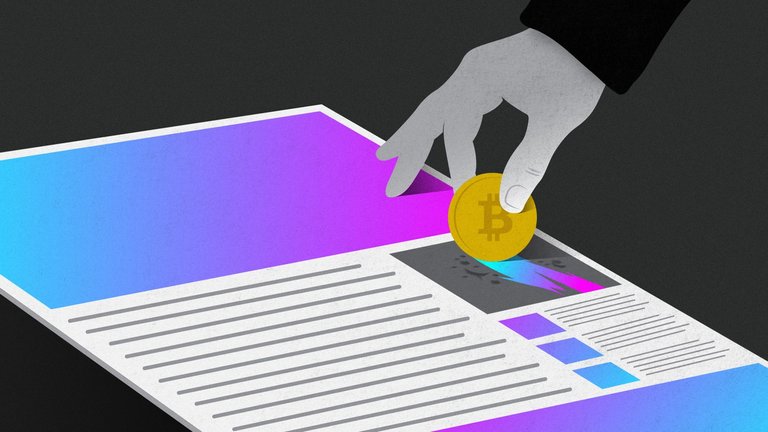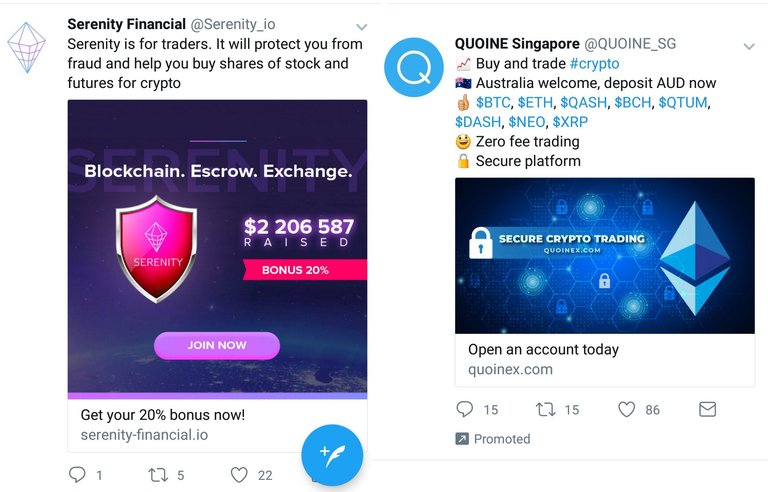
Earlier this year, Facebook banned bitcoin ads, but they are alive and well on Twitter.
Despite Facebook's prohibition, some Australian Twitter users have seen a steady flow of ads for initial coin offerings (ICOs) and cryptocurrency exchanges.
The burgeoning world of digital currencies has acquired an unfortunate reputation since Satoshi Nakamoto's bitcoin emerged in 2009.
Facebook said it was shutting down ads that were, "frequently associated with misleading or deceptive promotional practices", including ICOs and cryptocurrency.
Ads that might say things like:
"New ICO! Buy tokens at a 15% discount NOW!"
In 2017, the Scamwatch website run by the Australian Competition and Consumer Commission (ACCC) received 1,289 complaints related to bitcoin, particularly investment scheme scams, with reported losses totalling $1,218,206.

Much like an initial public offering, an ICO is a way to raise money for a new business. Instead of shares, an ICO offers "tokens", which are typically bought using existing cryptocurrencies like bitcoin or ethereum.
For some, this is a way to avoid institutional investors, but other ICOs have made questionable claims or disappeared with user funds.
In September, the US Securities and Exchange Commission accused the creator of a cryptocurrency backed by diamonds with defrauding investors, alleging it had no diamonds after all.
In December, it charged the founder of the PlexCoin ICO with violating anti-fraud provisions by promising investors 1,354 per cent profit in less than 29 days.
Who is advertising to Australians?
Many of the cryptocurrency projects advertising to Australians on Twitter in recent weeks appear to be foreign.
While some are based in Asia — such as the South Korean cryptocurrency exchange Bithumb, or Singapore's blockchain-powered financial services platform QUOINE — a number are Eastern European.

One company, Dorado ICO, seems to be largely based in Lithuania, while Serenity Financial, which suggests its SERENITY tokens will be used to pay for "transparent brokerage services", has Russian founders according to its website.
ICOs often make significant claims about their product, both in their ads and on their websites.
Dorado, for example, says in its Twitter ad that it is "the next Uber on blockchain".
The ICO claims to be built on an Eastern European food delivery company Foodout Group, and says it will use blockchain technology to allow "anyone to have anything delivered on-demand" by "local couriers, drones, robots".
The company has also made at least one significant alteration to its website while allowing investors to buy its ICO tokens.
One of its board members, Pedram Assadi — who was removed from the ICO website this week — was claimed in his site biography to be head of operations at Uber Eats in the Middle East. It also detailed that he worked "in executive positions" at companies like IBM and Amazon.
IBM declined to comment about Mr Assadi's employment, but his LinkedIn profile claims that he worked in "Finance" at Amazon and as a business consultant at IBM. Neither appear to be executive positions.
Amazon and Uber did not return request for comment.

Dorado also says it is backed by "first-tier institutional investors", including the venture capital company Gold Fish Fund.
Gold Fish partner Jonas Karosas is also Dorado's CEO and the founder of Foodout, according to the companies' respective websites.
Dorado has been approached for comment. Attempts to reach Mr Assadi were unsuccessful.
Should Twitter allow crypto-ads?
In Australia, Twitter permits the promotion of financial services, with some restrictions.
Twitter declined to comment on specific questions about the cryptocurrency ads on its platform but a spokesperson pointed to its ad policies, which prohibit misleading or deceptive claims.
The social media company is said to be developing a new policy for cryptocurrency ads.

Dr Michael Mehmet, a marketing lecturer at Charles Sturt University, said Facebook's bitcoin ban may have more to do with its own reputational issues (amid ongoing investigations into the Russia-US ad scandal) than bitcoin itself.
Twitter, on the other hand, has a smaller user base and may be concerned with maintaining advertising revenue, Dr Mehmet suggested.
In February, the company announced its first-ever profitable quarter — ad revenue grew 1 per cent to $US644 million.
"There is no single reputation for Twitter. Different users will perceive it from different perspectives," Dr Mehmet said.
The Australian Securities and Investments Commission (ASIC) has warned investors ICOs are "highly speculative investments" and many have turned out to be scams.
ASIC spokesperson Gervase Greene said "a fair part" of the cryptocurrency environment is not regulated by ASIC, but the law is typically platform-agnostic.
"To indulge in misleading or deceptive conduct, or attempt fraud or similar, will be considered a breach of regulations, consumer law or perhaps criminal laws regardless of the media vehicle," he said.
"Obviously consumers always need to be wary of what they read or hear, where they read or hear it, and from whom."
source: http://www.abc.net.au/news/science/2018-03-02/facebook-banned-bitcoin-ads-twitter-hasnt/9493780
Hi! I am a robot. I just upvoted you! I found similar content that readers might be interested in:
https://www.news.mixtarka.com/misleading-bitcoin-ads-were-kicked-off-facebook-now-theyre-on-twitter/